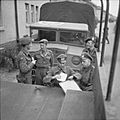Ceasefire facts for kids
A ceasefire is when people fighting in a war or conflict agree to stop for a period of time. It's like a timeout in a game. Both sides agree to stop attacking each other. Ceasefires can be part of a formal treaty, which is a written agreement. But sometimes, they are just an informal understanding between the groups fighting.
Contents
Times When Ceasefires Happened
The Christmas Truce in World War I
On December 24, 1914, during World War I, something special happened. Soldiers from Germany and Britain had an unofficial ceasefire. They wanted to celebrate Christmas. There was no official agreement signed. After a few days, the fighting started again. This event is often called the "Christmas Truce."
The Korean War Ceasefire
A ceasefire was agreed upon on July 27, 1953. This stopped the fighting in the Korean War. It also created a special area called a demilitarized zone. This zone acts like a buffer between the two sides. However, no peace treaty has ever been signed. This means that, officially, North Korea and South Korea are still at war.
Modern Ceasefire Examples
Kashmir Conflict Ceasefire Line
The Kashmir conflict has a ceasefire line. This line separates areas controlled by India and Pakistan. Pakistan has said that India built a fence along this line. This fence was built to stop people from crossing into the disputed area. Indian military sources say the fence has greatly reduced the number of fighters crossing over. The fence was finished in late 2004.
Israeli–Palestinian Ceasefire
Another ceasefire happened in the Israeli–Palestinian conflict. It was announced on February 8, 2005. The State of Israel and the Palestinian National Authority agreed to it. A Palestinian negotiator, Saeb Erekat, explained it simply. He said both sides agreed to completely stop violence against each other. This meant no attacks from either Israelis or Palestinians.
Related pages
Images for kids
-
A truce—not a compromise, but a chance for high-toned gentlemen to retire gracefully from their very civil declarations of war By Thomas Nast in Harper's Weekly, February 17, 1877, p. 132.
-
British and German officers after arranging the German handover of the Bergen-Belsen concentration camp and the surrounding area, negotiated during a temporary truce, April 1945
See also
 In Spanish: Alto el fuego para niños
In Spanish: Alto el fuego para niños



